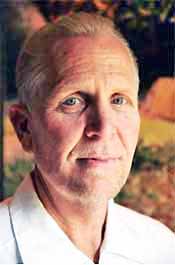 By Dr. Ted Wiard
By Dr. Ted Wiard
Editors Note: This is an ongoing series by grief specialist Dr. Ted Wiard, dedicated to helping educate the community about emotional healing.
A lot of focus has been on COVID-19 and the underlying issues within this pandemic and we will continue to give information to help people as this pandemic continues to cause loss within the world.
Over the last few weeks there appears to be an increasing level of frustration as many of our reoccurring issues have a negative impact on the world, and there has not been any type of respite from the intensity of this pandemic.
Underlying epidemics are becoming prominent, such as an increase in addiction relapse, higher levels of suicidal intent and suicide itself, domestic violence, child abuse, mental health instability, crime and the list goes on. In the midst of enormous pressures on each person’s emotional health, the discomfort of feeling little progress towards success, blame will usually come rolling in like a bulldozer, exasperating fear and separation. As emotional instability increases, a person will start to look for external sources to hold what is making the person feel emotionally uncomfortable. This is natural as the brain is seeking for the sources that are causing the discomfort.
Blame is a difficult aspect of trying to establish internal homeostasis as there is a need to glean information from the past, search for accountability and then use that information in the present to build potential for the future. The difficulty is that blame has a tendency of leaving someone caught in the past, causing shame and guilt to others, as well as oneself. When this happens an individual and/or groups will start to increase wounds, cause less transparency, widen gaps in communication and other dysfunctional behaviors.
The key for emotional health is to glean information from the past so that it can be more helpful in present decisions. The difficulty is as there is an increase in emotional dysregulation, there is also regression in emotional maturity and a higher demand for an external rescue, rather than an internal process of seeking what actions are available. As there is an external blame, there is an unconscious or conscious demand for an external rescue.
A good example is the present pandemic and the many issues of blame from countries, vaccines, politics and lack of information. Each one of these “blames” may have truth, but it does not change the present situation. As a person decreases blame, gathers facts, and examines what can they do themselves, there can be a decrease in distress, and the person can start to reestablish emotional maturity and say to themselves, “What action can I take rather than demanding someone change it for me?”
As the nervous system regains bits of autonomy, it can start to move out of hyperarousal and start to find a baseline for mature decision making, and transition from being agitated and frozen to a place of certain levels of action. The trick is to assess the outer world, gather the data and then decide what is healthy for positive actions to help move out of the demand for an external rescue and an interdependent action. This will help on a macro and micro world as each person takes responsibility with healthy behaviors, while supporting others while they do the same.
The old saying, “You can look back, just don’t stare” is a great way to say glean wisdom from the past and now act from the present. I wish you well, and until the next time, take care.
Golden Willow Retreat is a nonprofit organization focused on emotional healing and recovery from any type of loss. Direct any questions to Dr. Ted Wiard, EdD, LPCC, CGC, Founder of Golden Willow Retreat GWR@newmex.com or call at 575.776.2024.

